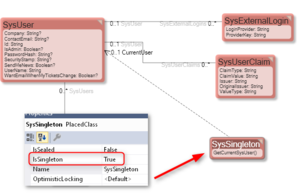(Automatically adding template at the end of the page.) |
(Adding message template to the top of the page) |
||
| Line 1: | Line 1: | ||
{{message|Write the content here to display this box}} | |||
There is an operator in OCL you may not know about yet: oclSingleton. | There is an operator in OCL you may not know about yet: oclSingleton. | ||
Revision as of 22:25, 16 June 2024
Write the content here to display this box
There is an operator in OCL you may not know about yet: oclSingleton.
Use it like this: Class1.oclSingleton <and follow with operations or navigations on that single instance>
If Class1 does not have an instance at the time of executing the oclSingleton, one is created.
To use this, set the taggedvalue on Class1 “Eco.IsSingleton” to “true”.
It is a very practical design pattern to have a modeled Singleton class – this removes the need for other global variables – like logged-in user, etc. Since the Singleton class can have code-derived attributes and associations, you can pick up important info from the running environment and make it available in the model context. Try it – it will make your code less hairy.
oclSingleton is an operator that helps you implement the Singleton pattern (the pattern states that there is exactly one instance of this class - never more, never less).
If you mark a class with IsSingleton=true, you can use this oclSingleton operator to get access to the only object instance of this class.
Example:
Class: SysSingleton
Common expression: SysSingleton.oclSingleton.CurrentUser.IsAdmin -- this expression looks up the only SysSingleton instance that acts as a Global variable that points out the CurrentUser.

